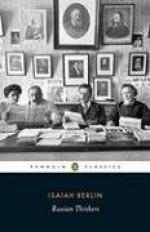
|
| Name: _________________________ | Period: ___________________ |
This test consists of 5 multiple choice questions, 5 short answer questions, and 10 short essay questions.
Multiple Choice Questions
1. How does Berlin describe conservative Romantics?
(a) Conservative Romantics believed that intellectuals could thrive without changing the aristocratic government.
(b) Conservative Romantics believed that the best progress was a return to traditional Russian values.
(c) Conservative Romantics believed that mechanical reforms would not work without a deep understanding of the Russian soul
(d) Conservative Romantics believed that progress was a trap, and that the only way out would be to develop Russian nationalism.
2. How did Herzen see human society?
(a) Herzen saw human society as the victim of industrial expansion.
(b) Herzen saw human society as a number of connected--or disconnected--individuals.
(c) Herzen saw human society as a spiritual reality in itself.
(d) Herzen saw human society as the sum total of each individual's experiences.
3. What did Herzen predict in "From the Other Shore"?
(a) World War I.
(b) The Thirty Years War.
(c) The triumph of Communism in Russia.
(d) The decline of Europe.
4. What does Berlin say was the "French" attitude toward the arts?
(a) Artists are prophets whose lives are instructive to the masses.
(b) Artists are the saviors and redeemers of culture.
(c) Artists are only legitimate if they are bohemian: sloppy and irresponsible.
(d) Moral faults in the artist do not affect the artwork.
5. What was Bakunin's relationship with Herzen?
(a) Herzen was the better intellectual.
(b) Herzen was susceptible to Bakunin's improvident optimism.
(c) Bakunin was inspired by Herzen's experience.
(d) Bakunin learned his theories under Herzen's tutelage.
Short Answer Questions
1. What was the name of the committee in charge of government censorship?
2. Who was exiled to Siberia because of the trial of a group of conspirators?
3. How does Berlin characterize Bakunin's ideas?
4. What was Turgenev's "negative Hegelianism?"
5. How did the epoch that followed the Tsar's acts in the wake of the Decembrist Rebellions end?
Short Essay Questions
1. Name some of the thinkers who influenced Herzen's thinking.
2. What were the three accomplishments of the intellectuals who rose to prominence in the 1830s and 40s?
3. What example does Tolstoy use to explain why human beings cannot know all the actions and causes that affect their experiences?
4. What was the effect of the "moral quarantine" of Western ideas in Russia?
5. What was Russia's cultural situation in the 1830s and 40s?
6. What did Nicholas Stankevich find attractive in Hegel's theories?
7. What was Annenkov's role in the circle of Russian Intelligentsia?
8. What did Russian students learn in German universities?
9. What conspiracy group did the Second of April Committee unveil, and what was the result of the trial?
10. How did Bakunin react to Hegel's philosophy?
|
This section contains 766 words (approx. 3 pages at 300 words per page) |

|




